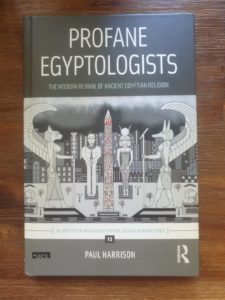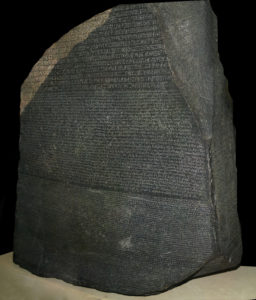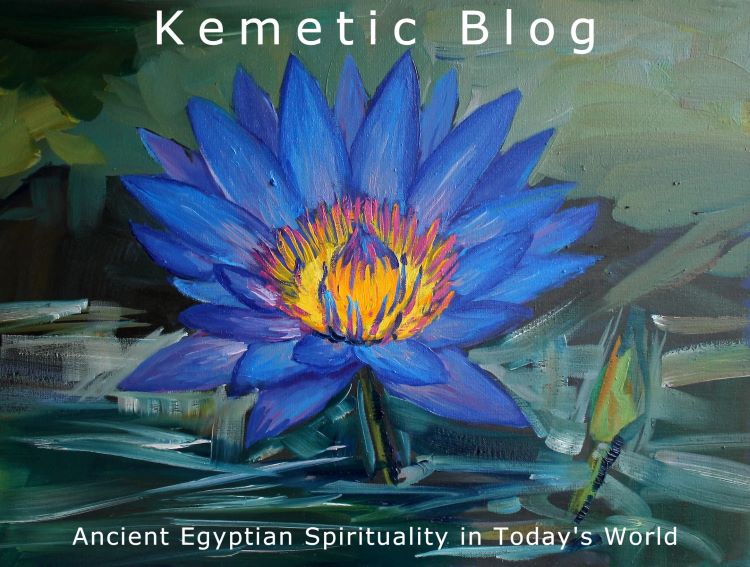
Image © 2021, 2022 Scott Rose
The continuation of my review on Profane Egyptologists is long overdue. My apologies to any and all who’ve been waiting.
I’ll blame it on Uni; I’m an enrolled nurse in Australia, studying to become a registered nurse. As such, I don’t have a lot of time for leisure reading, however, I’m determined to finish reading Profane Egyptologists this year. Profane is different from other Egyptology books because it’s not really about Egyptology, at all. Rather, it’s about today’s modern Kemetic pagans and the reconstruction of ancient Egyptian religion. It’s a book about us. (Meanwhile, I swear to the gods, this is the last degree I’ll ever do. Unless I have a really, fantastically good reason to go through this torture again — like a super high salary or an incentive, such as making a pilgrimage to Egypt. Not that I want to sound insensitive; I’m a very conscientious and compassionate nurse — I just need to move on with my life and actually have a life).
Enough personal drama! Let’s get back to the book.
In Part Two of Profane Egyptologists, Paul Harrison defines the dimensions of ancient Egyptian religion as a Pharonic Religion. Most of what we know about the religion of ancient Egypt today, comes to us from sources intended for use by kings in the afterlife. Or so it seems — more on alternative theories later. While achieving immortality of the pharaoh was a priority in ancient Egyptian society, in order to assure its stability and continuation both in practical and spiritual terms, Harrison also examines the concept of personal piety (or closeness to the gods through correct conduct, or Ma’at) among the non-elite and the evidence we have for the existence of such relationships. The discovery of shrines (or evidence of these), along with various other devotional and ritual items found in workers’ quarters provide us with the archaeological evidence of personal, pious relationships amongst the non-elite of ancient Egypt with the divine. This evidence allows us to blast through any paradigms, which maintain that ancient Egyptian religion was purely a political and funerary exercise of the elite, that held no personal significance to everyday people. The details of this evidence and where it was found, I’ll leave up to the reader to explore by sourcing the book themselves.
As for modern, practicing Kemetics, Harrison makes a very fair recommendation in regards to our practice — without attacking anyone — that if we wish to legitimise our relationship with the divine as a valid reconstruction of ancient Egyptian religion, if we want a chance for acceptance by the wider Egyptological community and the public at large, then our claim to Kemeticism must be able to withstand some basic scrutiny. To achieve this, we must understand what it is we are reconstructing and be able to back ourselves up with relevant sources, which we use to aid in our reconstruction. These sources, according to Harrison, should come from the historical record and they include, the Pyramid Texts and Coffin Texts, both of which, contributed to the Ancient Egyptian Book of the Dead (also called, the Book of Going Forth by Day — which is quite a contrast of titles). These texts are believed to be the foundations of the religious writings in ancient Egypt. Keep in mind, these are the writings that have survived to the present day. We don’t know how many other texts could have been written, which are no longer extant — or have yet to be discovered.
Allow me to interject with my own opinion on the profanity!
Look, I’m not a construction worker in any way, shape, or form and I don’t pretend to be. I don’t concern myself a great deal with reconstructionism. Instead, I wing it with Isis. In other words, I’m a self-styled intuitive Kemetic. My lived experience of the deities and of the ideals held by the ancient Egyptian people are primarily based on what I perceive via intuitive faculties. This is what works for me; it may not work for you. This is why I advocate for a blended knowledge-base of Kemeticism, incorporating both subjective and objective information to achieve our highest potential. I’m not super-fussed with perfectly reconstructing anything. From my perspective, a perfect reconstruction of ancient Egyptian religion is not what makes it authentic. You could do everything ‘the right way’, follow all the right people and right sources, and still be left feeling empty, like something is missing. A person’s quality of spiritual life attests to the authenticity and effectiveness of their practice, and I think this holds true no matter what religion you’re practicing or time period you’re researching. For any modern person to put forth exactly what ancient Egyptian religion was and was not is an incredibly bold venture. As Profane Egyptologists points out, there wasn’t even a word for religion in ancient Egypt. We know that a highly developed state religion did indeed, exist in ancient Egypt and the people were themselves, reputed to be highly religious. According to Herodotus in, An Account of Egypt:
“They are religious excessively beyond all other men, and with regard to this they have [many] customs…”
What a magnificent account!
Ancient Egyptian religion was never static but was always changing and evolving through time and it also varied according to location. The religion of ancient Egypt was diverse, with local gods and goddesses, cult or ritual actions, customs and observances that all took place within their own contexts. These we can begin to untangle and attempt to make sense of, in our efforts at reconstruction — if that’s the path we want to take. One point agreed upon across disciplines is the ancient Egyptian mind set and world view was vastly different from Western thought today. Boundaries between the physical and non-physical worlds were overlapping and less defined. Hence, why Harrison and other authors (including Egyptologist, Jan Assman) advise a degree of caution when making our own interpretations and assumptions regarding the ancient Egyptians, in particular, their philosophy, religion and spirituality. We can’t know for sure, is the general consensus. For an intuitive, that’s a maddening conclusion to suggest. Yes, we can know! Just tune into it! However, I’ll play Set’s advocate for just a moment.

The Rosetta Stone. Image © Hans Hillewaert via WikiMedia
The problem many of us contribute to today, conceivably myself included, is imposing our own cultural interpretations and meanings to ancient Egypt, thus making the society out to be something it wasn’t, only setting ourselves up for later disappointment. This is what happened to the early Egyptologists, upon translating the Rosetta Stone. What the ancient Egyptians had to say in their writings, once the hieroglyphics were decoded, wasn’t exactly the type of wisdom that preceded ancient Greek philosophy, which is what Egyptologists of the time-period were expecting. Instead, the ancient Egyptians appeared as ‘semi-barbarians’ to the Egyptologists. It’s theorised it was this misunderstanding and disappointment, which led to the current paradigm in Egyptology today, one that focuses on the political and funerary functions of ancient Egyptian religion, as if it were the only functions it served. This representation focuses exclusively on the elite, which we know from the evidence, is incomplete. The book also suggests certain esoteric societies in comparatively recent times are guilty of claiming a mystical lineage dating back to ancient Egypt and its religio-magical practices, for which there is insufficient evidence to support. These errors throw accuracy out the window, thereby threatening to dilute the credibility of those who practice ancient Egyptian religion today. What exactly are we practicing — is it really ancient Egyptian religion? This is something we as Kemetics need to be clear about.
Having said that, despite the above warnings from academics, I would say, don’t let the cautionary statements of scholars shut you down, and discourage you from opening your own mind and experimenting. The ancient Egyptians surely did not forge their relationships with the divine by having closed, rigid minds. The modern Kemetic mindset might be closer to the ancient Egyptian mindset than we think — along with the added advantages of modern, scientific understanding. We should not assume the mindset of the ancient Egyptians is unattainable to us today. What if the ancient Egyptian mindset was not only attainable, but available to all who seek it, better equipping us with a more comprehensive world view? If the ancient Egyptians and their gods had nothing of value to offer our growth and development in modern times, we would not be attracted to their ways. Likewise, the netjeru would not be attracted to ours.
In my own subjective mystical work with these beings, it has been made known to me that the attraction is mutual. Ancient Egyptian deities and spiritual guardians love modernity; the gods continue to work with us today, irrespective of whether or not we can perceive them, or if we choose to worship them. They benefit from our stewardship and growth, regardless. A mutual relationship with these beings, whom we call gods, is available to those willing to tap into it. This is the premise of my own Kemetic practice. Note, however, I cannot speak for all Kemetics. Each practitioner must decide for themselves the nature of their own practice.
Profane Egyptologists considers a shamanic re-interpretation of ancient Egyptian religion, popularised by Jeremy Naydler in his work, Shamanic Wisdom in the Pyramid Texts.
The shamanic theory turns all cautionary statements about personal interpretations of ancient Egyptian religion on its head. Perhaps as it should be. So far, I’ve completely neglected to mention the work of Naydler, which is a complete disservice, so let me mention him here. Rejecting the purely political and funerary roles of ancient Egyptian religion, Profane Egyptologists also considers an alternative theory, which states the Book of the Dead was meant just as much for the living and contained within it, a treasure trove of shamanic wisdom applicable to life and was not exclusive to the afterlife. If we consider the saturation of magic and animal-human gods in ancient Egypt, shamanism (or entering altered states of consciousness to retrieve information and experiences relevant to spiritual growth) is not a far cry away. This theory is deserving of its own post, which I will have to do at some point, but I wanted to plant the seed here because I should have done so back in Part One of this review. Harrison appears to be a supporter of the shamanic theory, as am I. Clearly, the ancient Egyptians knew how to shift their awareness from the realities of everyday life and expand their consciousness. It couldn’t be more obvious! How do we suppose ancient Egyptian religion originated in the first place?
To me, this is what Kemeticism is, and what the old religion was: a merging and marrying of both human and divine consciousness, which we catch glimpses of during altered states. This process is decidedly shamanic in nature. Today, we are not so much reconstructing something as we are reviving it, and the word revival is right in the subtitle of Profane Egyptologists: The modern revival of ancient Egyptian religion. This is an ancient religion brought firmly into the present. Consider for a moment, had ancient Egyptian religion survived to the present day, how it was practiced then and how it would be practiced now would show marked differences. Based on this argument alone, I hope we can lay to rest the endless wild goose chase of, it must be done this way, not that way. We have evidence but we still don’t know anything, so you can’t say or do anything, because if you do, you’re a charlatan with no claim to legitimacy.
I can say with confidence, that I do feel more educated after reading Profane Egyptologists. Paul Harrison is a fantastic author, perhaps not the most accessible to non-academics, as the book formed part of his PhD but the arduous literary journey is worth the effort. The book allows you to understand the Kemetic community and the issues we face today, and it should help you to solidify your own position and purpose as a Kemetic. In Profane Egyptologists, Harrison presents many insights into both Egyptology and Kemetic neo-paganism.
Thank you, for reading Kemetic Blog. I hope you found its content informative and useful. In Part Three, we will delve into the history and practices of today’s Kemetic pagans, which is very exciting. Hope to see you then, feel free to connect and comment below. As always, stay safe and well.
Profane Egyptologists: The Modern Revival of Ancient Egyptian Religion
by Paul Harrison
ISBN 9780367891015
Published December 12, 2019 by Routledge
244 pages
Cover art by Setken
𓆸
© Scott Rose / Kemetic Blog – All Rights Reserved.

1 Comment
How to write your own 42 Positive Confessions for Kemetic practice
May 13, 2022 at 11:39 am[…] of information in the reconstruction and revival of ancient Egyptian religion was covered in part 2 of my book review of Profane Egyptologists by Paul Harrison. This post may be considered at least […]